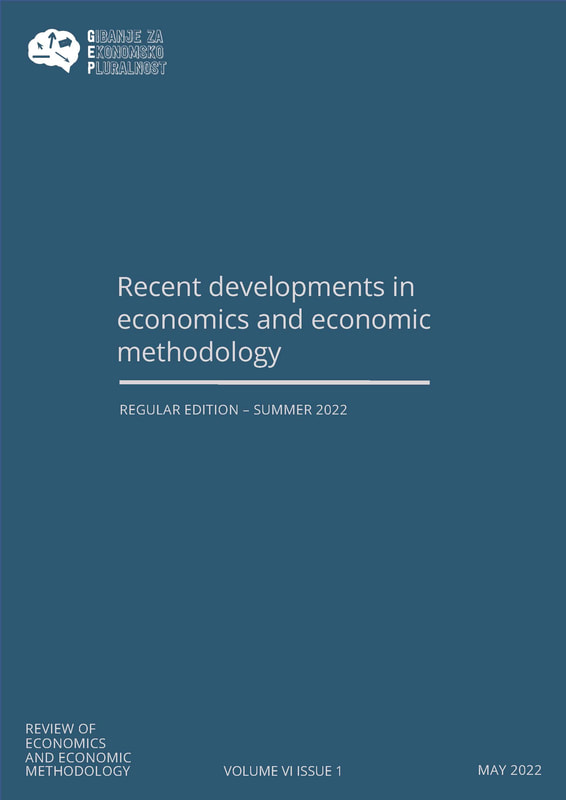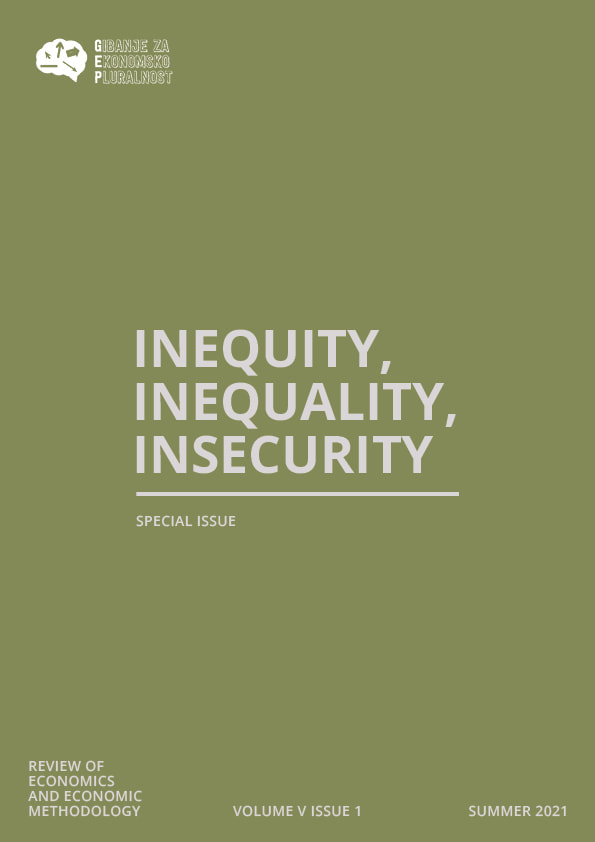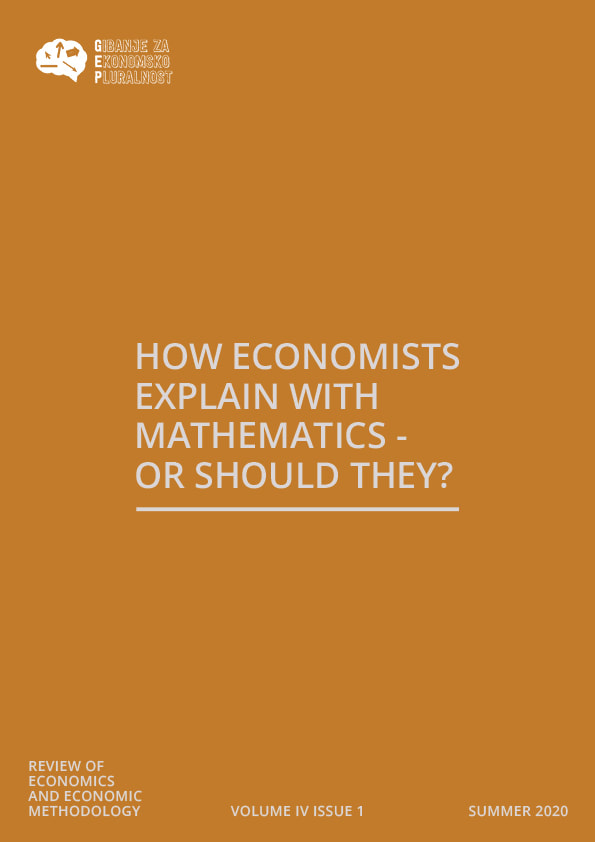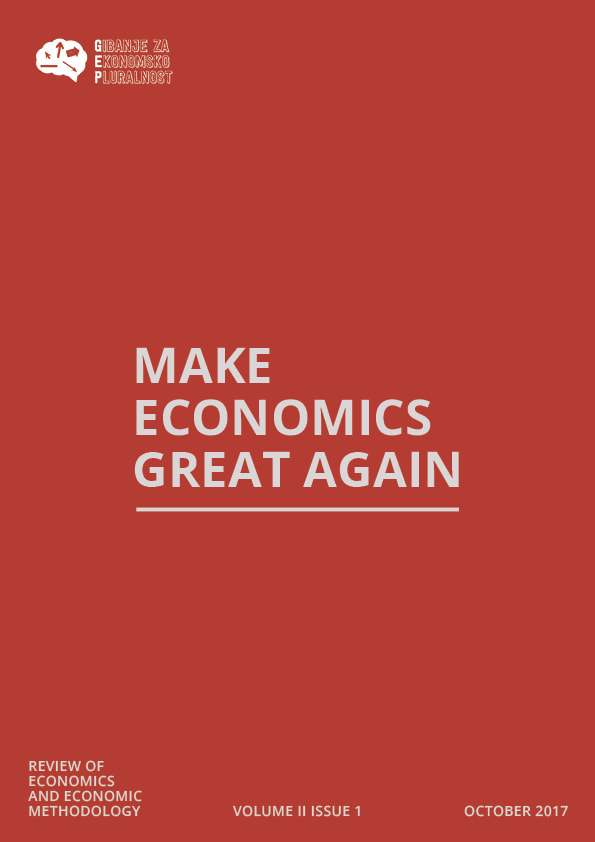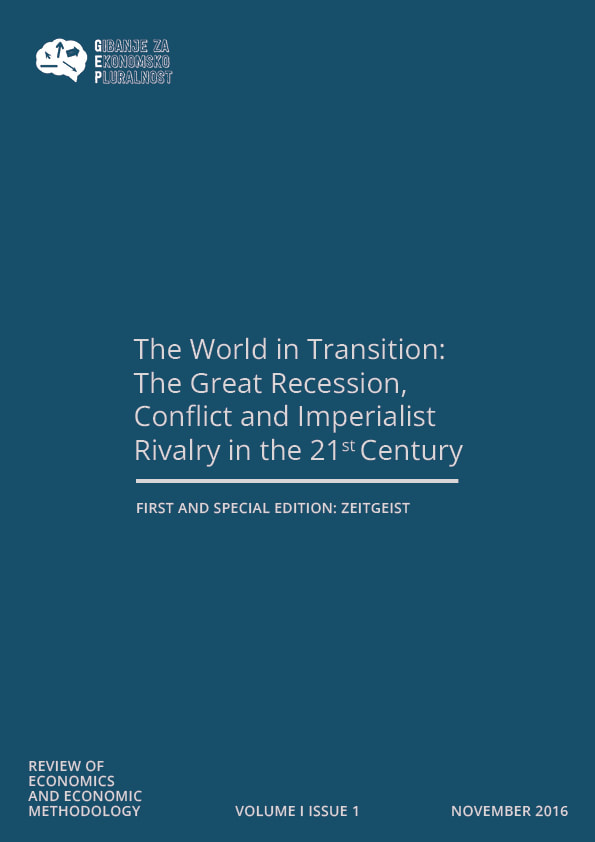|

ISSN number: 2536-1953 REEM is published by the Movement for economic pluralism, University of Ljubljana, School of Economics and Business Reach us at reemslovenia@gmail.com |
Calls for papers
Volume VII, Issue 1, 2024
Pre-publications
Socialist Feminism: A New Approach by Frieda Afary
Book Review by Ari Parra
[DOWLOAD PDF]
Elastic wages versus inelastic prices in Greece and Portugal: The absolute advantage theory and the non-tradable sectors
Tasos Papafragkos
[DOWNLOAD PDF]
A Post-Keynesian Model for Controlling GDP and Debt
Charalampos-Anastasios Domenikos and Stelios Kotsios
[DOWNLOAD PDF]
|
Volume VI, Issue 2
The Future of (Pluralist) Economics
|
Published issues
Volume VI, Issue 1
Summer 2022
|
Editorial Address
Andrej Srakar [Download PDF] [View online] Rethinking Corporations David Ellerman [Download PDF] [View online] Marcora for Slovenia: What are the fiscal consequences of the much-needed legislative innovation? Elena Galevska, Kosta Marco Juri, and Tej Gonza [Download PDF] [View online] Enactive Economics: Interactionism, Social Cognition and Epistemic Horizons Goghie Alexandru-Stefan [Download PDF] [View online] The Incommensurability, Incompatibility and Incomparability of Keynes’s and Walrasian Economics Arne Heise [Download PDF] [View online] Unexpected Applications of Lund’s Early Retirement Extreme. Manuel Tarrazo [Download PDF] [View online] David Ricardo’s Theory of Foreign Trade vs Modern Comparative Advantage Theory Ridhiman Balaji [Download PDF] [View online] |
Volume V, Issue 1
Summer 2021
|
Inequity, Inequality, Insecurity: Introduction to REEM Special Issue. I-IV.
Ivan Rubinić [Download PDF] [View online] Inequality in Marx and Piketty: Theory and Policy Implications. 1-32. Nikos Stravelakis [Download PDF] [View online] Contemporary Factors of Economic Growth and Competitiveness: Theoretical Aspects. 33-60. Marko Tomljanović, Pavle Jakovac, and Dejan Bodul [Download PDF] [View online] OK, Capitalism. 61-70. Tej Gonza. [Critical comment on 'Capitalism Alone' by Branko Milanković] [Download PDF] [View online] Mainstream Discourse on Inequality. 71-85. Ridhiman Balaji [Review Essay on 'Economics in the 21st Century' by Robert Chernomas and Ian Hudson] [Download PDF] [View online] Social Capital and Innovation: Evidence from the US (1997-2014). 88-108. Rosselia Viggiano [Download PDF] [View online] Tyranny of Merit: What's Become of the Common Good' by Michael J.Sandel. 109-118. Petar Milijić [Book review] [Download PDF] [View online] |
Volume IV, Issue 1
Summer 2020
|
For More Mathematics and Theory in Economics. 1-6, Andrej Srakar [Editorial address]
[Download PDF] [View online] How Mathematics Obscures Conceptual Errors in Arrow-Debreu General Equilibrium. 7-30. David Ellerman [Download PDF] [View online] On Methodological Pluralism in Economics. 31-52. Aleksander Kešeljevič [Download PDF] [View online] Control Theory without Controls. 53-78. Romar Correa [Download PDF] [View online] Controversies Regarding the TTIP Agreement in the Academic Literature. 79-103. Maik Huettinger and Aras Zirgulis [Download PDF] [View online] A Complex but Interesting Relation: Keynes, Mathematics, and Statistics. 104-130. [Download PDF] [View online] Social and Solidarity Economy: A Quest for Appropriate Quantitative Methods. 131-156. Irene Sotiropoulou [Download PDF] [View online] The Wealth of (Some) Nations: Imperialism and the Mechanics of Value Transfer. 157-170. Ivan Rubinić [Book Review] [Download PDF] [View online] |
Volume III, Issue 1
Autumn 2018
|
Should We Remember Ricardo? 1-16. Sušnik, U. [Editorial address] [Download PDF] [View online] On Price Normalization and Choice of Techniques in Ricardo's Theory. 17-28. Manoudakis, K. [Download PDF] [View online] Ricardo, Marx, Keynes: Distinct Economic Visions? 29-43. Bandala, J.G.M. [Download PDF] [View online] Absolutne stroškovne razlike razlike in trdovratna trgovinska neravnovesja: Harrodijanski proces usklajevanja. 44-49. Shaikh, A. [Seminal texts in Slovenian] [Download PDF] [View online] Letters of Ricardo to Malthus. 50-55. Trobec P. [Book reviews] [Download PDF] [View online] Body, Language, and Meaning in Conflict Situations. 56-64. Conič, M. [Book reviews] [Download PDF] [View online] |
Volume II, Issue 1
Spring 2017
|
Make economics relevant again. 1-8. Managing editors [Download PDF] [View online] Reframing the labor question: On the marginal productivity theory and labor theory of property. 9-44. David Ellerman [Download PDF] [View online] In need for a drastic change: On the ''evidence-based'' debates in cultural economics and cultural policy. 45-62. Andrej Srakar [Download PDF] [View online] Why established macroeconomics is problematic and how this situation can be overcome. 63-83. David Chester [Download PDF] [View online] Socialism and Marxian economics: An overview. 84-101. Ema Talam [Download PDF] [View online] Choreography of resolution: Conflict, movement and neuroscience. 102-108. A book review by Maruša Conič [Download PDF] [View online] |
Volume I, Issue 1
Autumn 2016
|
Editor's Corner: Economics and the Manchester System. 1-8. Urban Sušnik [Download PDF] [View online] From Paucity to Inefficiency: The Case of Democratic Economic Governance. 9-37. Tej Gonza [Download PDF] [View online] The lowest in the world and falling? Explaining the movements of income inequality in Slovenia during the financial crisis. 38-69. Andrej Srakar in Špela Zupan [Download PDF] [View online] Institutions and Economic Development: A More Complete View to Understanding Economic Growth. 70-87. Maruša Arzenšek, Domen Bider in Urša Ferjančič [Download PDF] [View online] Financing obstacles to the realization of 21st century socialism. 88-115.Victor van der Weerden [Download PDF] [View online] |
Introduction to the first edition of REEM
|
When the global financial crisis hit western economies and stopped them in their tracks, it seemed that BRIC’s, with their continued growth and imperialist aspirations, were turning the balance of power in their favour. Today it is clear that this is no longer the case. The allure that Brazil, Russia, India and China might have had has long since vanished. To make matters worse, the European institutions, built on dubious theoretical underpinnings to begin with, are crumbling in the face of a refugee crisis for which the foreign policy of EU’s biggest ally is largely to blame. As the system is plagued by secular stagnation, it starts to resemble a zero-sum geopolitical game, a modern version of mercantilism in a world where new regional free trade blocks are meant as much to include some as to exclude others. And the fallout of 'The Great Game' is a refugee crisis that has been a triumph for reactionary political forces in the third world as well as in Europe itself. Beneficent actions and motives that could possibly justify charitable behaviour occupy a central place in morality. Peter Singer in his provocative paper ‘Famine, Affluence and Morality’ (1972) advocates extremely demanding and far-reaching principles of obligatory beneficence on the basis of a very intuitive premise. “If - he says - it is in our power to prevent something bad from happening, without thereby sacrificing anything of comparable moral importance, we ought, morally, to do it”. The three-dimensional crisis of today dwarfs the non-transparent and secretive trade agreements that are intended to provide additional institutional support to global corporations, which, hiding behind the current societal dynamics, continue their business as usual. What is more, these free trade agreements seem only to increase the power of these corporations over consumers, local producers, and environmental concerns, masquerading under the banner of free trade. While changes in the economic and social environment are more pervasive than ever, economics as a science seems to be deaf to the need for deeper understanding. With the emphasis on equilibrium, economic rationality and a frictionless world, neoclassical economics remains to occupy the position of theoretical and methodological authority. Highly accredited academic journals continue to discriminate the content on the basis of this ‘ideology’ while best universities resist the need to open the curriculum in order to grasp the dynamics of socioeconomic systems. As the world is on the brink of sinking into the 'abyss of a new dark age made more sinister, and perhaps more protracted, by the lights of perverted science' (Churchill, 1940), economic theory remembers the 80th anniversary of Keynes' General Theory and the 50th anniversary of Monopoly Capital, both very relevant to understanding the world today. Last year made it clear that financial capital, as long as it is free to move across borders, trumps national democracy, since whichever party gets elected is forced to implement virtually the same set of policies. Instead of having policies for a more humane world, we see growth in military expenditures, and Keynesianism for the financial markets. Yet if history has taught us anything it is that it never rests. |

